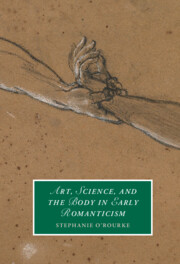Book contents
- Art, Science, and the Body in Early Romanticism
- Cambridge Studies in Romanticism
- Art, Science, and the Body in Early Romanticism
- Copyright page
- Contents
- Figures
- Acknowledgments
- Introduction
- Chapter 1 De Loutherbourg’s Mesmeric Effects
- Chapter 2 Fuseli’s Physiognomic Impressions
- Chapter 3 Girodet’s Electric Shocks
- Chapter 4 Self-Evidence on the Scaffold
- Notes
- Bibliography
- Index
- Cambridge Studies In Romanticism
Introduction
Bodies of Knowledge
Published online by Cambridge University Press: 28 October 2021
- Art, Science, and the Body in Early Romanticism
- Cambridge Studies in Romanticism
- Art, Science, and the Body in Early Romanticism
- Copyright page
- Contents
- Figures
- Acknowledgments
- Introduction
- Chapter 1 De Loutherbourg’s Mesmeric Effects
- Chapter 2 Fuseli’s Physiognomic Impressions
- Chapter 3 Girodet’s Electric Shocks
- Chapter 4 Self-Evidence on the Scaffold
- Notes
- Bibliography
- Index
- Cambridge Studies In Romanticism
Summary
The Introduction delineates a shared set of concerns animating both artistic practices and scientific discourses at the turn of the nineteenth century, which were deeply invested in the human body’s ability to secure the relationship between reality and illusion, and between seeing and knowing. It first reevaluates historical accounts of the decline of neoclassicism and rise of Romanticism, and particularly the waning pictorial supremacy of the idealized nude body. It then lays out the importance of “popular science” and “Enlightenment empiricism” for the cultural landscape of eighteenth-century Britain and Continental Europe, revealing how the scientific authority of the human body was undergoing intense scrutiny. Recognizing such developments as interlocking rather than parallel enables us to think more critically about how artworks interrogated some of the visual and structural features of popular scientific discourses and, ultimately, the empirical framework that undergirded them.
Keywords
- Type
- Chapter
- Information
- Art, Science, and the Body in Early Romanticism , pp. 1 - 21Publisher: Cambridge University PressPrint publication year: 2021

